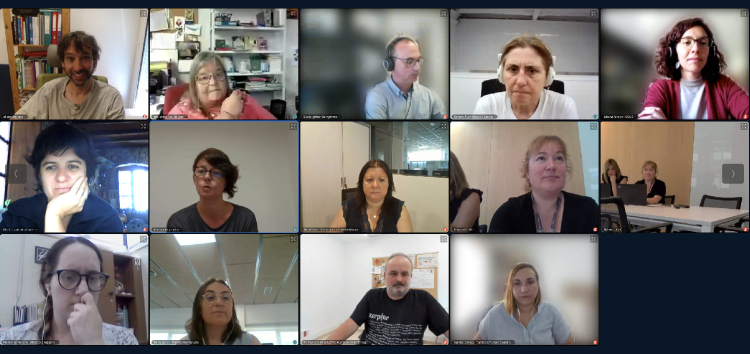Last Tuesday, May 28, the Xarxa Punt TIC community had the opportunity to learn more about the Manifesto of the Digital Rights of Children and Adolescents . Specifically, the fifth virtual meeting of the year 2024 had about fifteen participants, including Sandra Gómez from the Ferrer i Guàrdia Foundation , Ramon Oromí from Punt Òmnia góTIC Tàrrega de Tàrrega and Marta Capdevila from Punt TIC of the Tirant lo Blanc de Belianes Library . The online session also had the participation of Liliana Arroyo, director general of Societat Digital de la Generalitat de Catalunya, who welcomed the participants and presented the Manifesto of the Digital Rights of Children and Adolescents , promoted by the Secretariat of Digital Policies of the Department of Business and Work of the Generalitat de Catalunya and the Ferrer i Guàrdia Foundation. Arroyo affirmed that for the Directorate General digital rights were a key issue and especially digital rights linked to minors, since to talk about this group was to talk about society as a whole, which participated directly and indirectly in their digital upbringing. Arroyo added that despite the turbulent moment, where all eyes were focused on the use of mobile phones, it was necessary to open spaces for reflection and inspiration and for experiences to be shared and replicated.
Then, Sandra Gómez from the Ferrer i Guàrdia Foundation explained the construction process, the participation of children, teenagers and young people and teachers and the main demands collected. Gómez explained that the Manifesto of the Digital Rights of Childhood and Adolescence had two phases: the first validation of the conclusions of previous experiences and the collection of proposals with 9 focus groups and 162 children and adolescents and the second collective construction of the manifesto and planning of the presentation event with 4 work meetings and 6 children and teenagers. Gómez commented that the final document referred to five major areas: protection and privacy of personal data, autonomy and adequate support, training on digital tools, safer social networks and access to digital devices and the internet. Gómez exemplified that children and adolescents were asking for more clarity and more transparency, to bet on recommendations and alternatives and to avoid prohibitions, to work on digital accompaniment from an early age, to promote digital autonomy and to offer tools and resources to awaken the critical spirit and promote prevention and safety, as well as going beyond the recreational use of computers, tablets and mobile phones and offering training on digital support especially to families and formal and non-formal educational agents .
Next, Ramon Oromí from Punt ÒMnia gòTIC Tàrrega de Tàrrega spoke about accompaniment in the digital age and the responsible, safe and positive use of new information and communication technologies. Oromí explained that since 2001, he has been working to accompany citizens with value and values and that he does so from three positions: at the front generating and prescribing content, at the side sharing experiences and at the back promoting empowerment. Oromí explained that the Òmnia Point is part of the community and works with entities, associations and collectives on various initiatives and some of these initiatives are particularly linked to the use of digital devices by children and adolescents such as, for example, a social pact with educational centers to limit the use of phones in school environments, a group to address the relationship between teenagers and mobile phones, training spaces with families and sessions to talk about health and good habits. Oromí concluded by affirming that the manifesto is an excellent starting point and that as dynamizers of the ICT Point Network, there are many challenges and challenges to fill the future with experiences.
Next, Marta Capdevila from the TIC Point of the Tirant lo Blanc Library in Belianes spoke about a digital fiction project. Capdevila explained that fiction could be found both in books and in video games, since both were spaces where various languages intervened, and encouraged everyone to delve into the world of video games, a multimedia, participatory and non-linear world. Capdevila commented that currently 80% of young people were playing it and in the face of this reality, Punt TIC had opted for digital fiction with the aim of helping families and educational centers to identify good options. Capdevila shared that it could be done in a number of ways: book clubs, group play sessions, free play corners or digital fiction, which was simply about playing a game and then discussing and reflecting on various aspects such as , the attitude of the players, the music, the illustrations or the narrative. Capdevila ended by affirming that children were digital and that it was necessary to awaken their critical spirit. Finally, a round of questions was opened, where some of the facilitators of the ICT Point Network raised doubts and reflections.
The Manifesto of the Digital Rights of Children and Adolescents is a living document, reviewable and open to the accession of entities, associations and groups that wish to be part of it and promote the next steps.
Interested persons can join through this link online .



